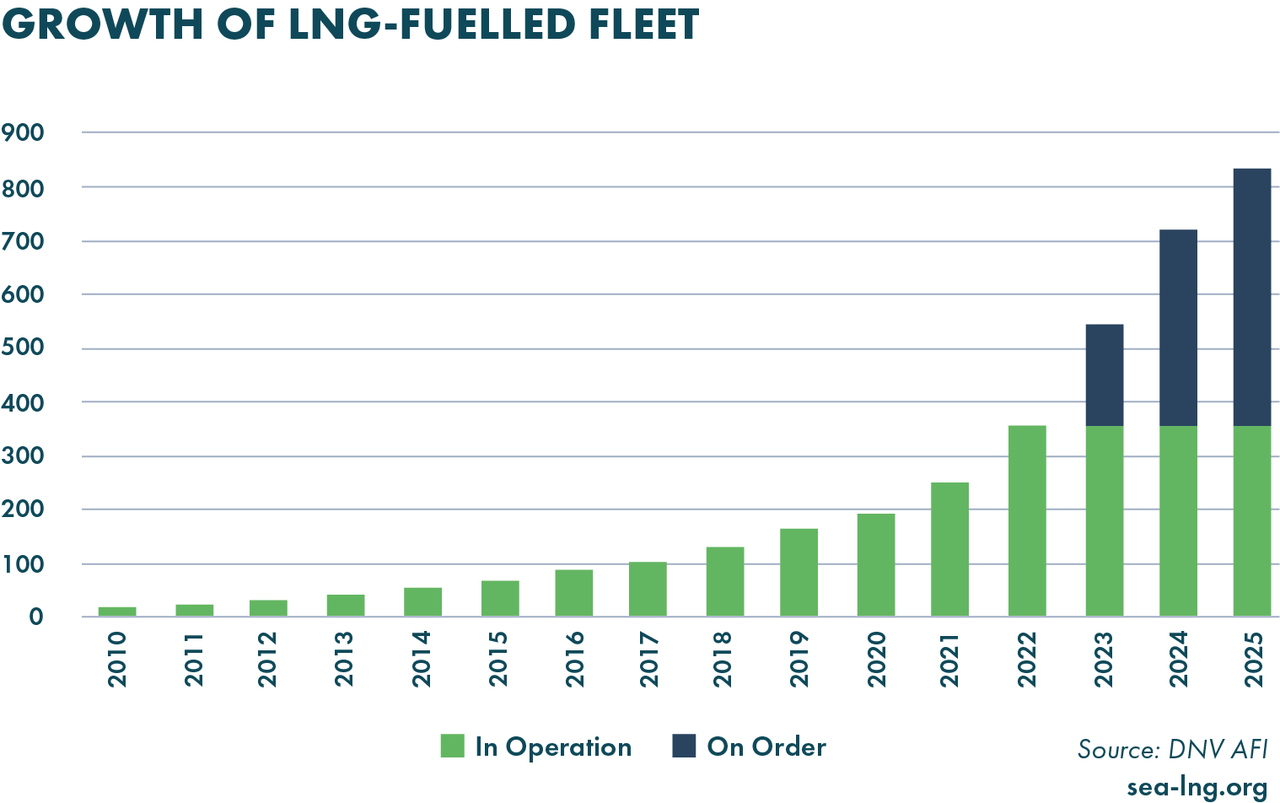The LNG-fuelled fleet continues to grow
According to the maritime classification and consultancy company DNV, orders for LNG-fuelled ships remained high in 2022, close to the record figure of 2021. The use of LNG as a marine fuel is part of the shipping industry’s pathway to decarbonisation, which is likely to take place incrementally.
According to the maritime classification and consultancy company DNV, there were 355 LNG-powered ships in operation in 2022. Despite high LNG fuel prices last year, the 222 orders for LNG-powered ships were registered in 2022, close to the record figure of 240 orders in 2021. [1, 2] Based only on existing orders (521 orders for LNG-fueled vessels placed in 2022), DNV forecasts the number of LNG-fuelled ships will reach 876 by the end of this decade. [2]

A diverse portfolio of LNG-fuelled ships was delivered in 2022. LNG-powered crude oil tankers lead the way with 47 in operation, followed by LNG-powered car and passenger ferries, oil/chemical tankers, and containerships each with 43 in operation. Methanol was the second most popular alternative maritime fuel choice, with 35 ships ordered. Thirty of these were large container vessels. [1]
Decarbonisation of the shipping industry
According to an industry-commissioned study, the use of LNG as a marine fuel can reduce GHG emissions in the maritime sector by up to 23% compared with very low sulphur fuel oil (VLSFO). [3] This is estimated on a full lifecycle “Well-to-Wake” basis, which takes into account the entire process of fuel production, delivery and use onboard ships, and all emissions produced therein. [4] While challenges exist with respect to methane emissions for some LNG-dual fuel engine technologies and upstream, these are being addressed through multiple industry initiatives. According to SEA-LNG, an industry coalition, decarbonisation of the shipping industry is likely to take place incrementally as the carbon intensity of fuels is gradually reduced through the use of low or zero-emission alternatives. [2]
On 14 July 2021, the European Commission presented the FuelEU maritime proposal within its “Fit for 55” package, with the objective of accelerating the maritime industry’s decarbonisation through the adoption of renewable and low-carbon fuels and technologies. [2, 5] The proposed regulation introduces increasingly stringent limits on carbon intensity of the energy used by vessels from 2025, which should oblige them to use alternative fuels. [5] LNG enables vessels to be compliant with the GHG intensity targets (calculated on a Well-to-Wake basis) proposed under the legislation until 2035. The use of a 20% drop-in blend of bio-LNG will extend compliance beyond 2040. Thereafter, compliance can be achieved through the use of increasing proportions of bio-LNG and renewable synthetic LNG (e-LNG) as and when they become available. [2]
BioLNG is produced by liquefaction of biomethane, which comes from the reuse of waste from farming activities, industrial applications and households. Production is growing rapidly with 78 plants in the EU expected to be operational in the next two years. [2] Currently, the cost of bio-LNG is around 3-4 times higher than fossil LNG. However, according to SEA-LNG, the cost is forecast to decline by around 30% by 2050, mainly driven by the reduced cost of producing biomethane in large-scale anaerobic digestion plants. [2]
Sources
[1] DNV: 222 LNG-powered ships ordered in 2022. https://lngprime.com/europe/dnv-222-lng-powered-ships-ordered-in-2022/70166/
[2] SEA-LNG. LNG – delivering decarbonisation. 2022-2023. https://sea-lng.org/2023/01/lng-delivering-decarbonisation/
[3] https://sphera.com/research/2nd-life-cycle-ghg-emission-study-on-the-use-of-lng-as-marine-fuel/
[4] https://marine-offshore.bureauveritas.com/what-well-wake-decarbonization-means-shipowners
[5] Fuel EU Maritime - Sustainable maritime fuels in “A European Green Deal”. https://www.europarl.europa.eu/legislative-train/theme-a-european-green-deal/file-fuel-eu-maritime
